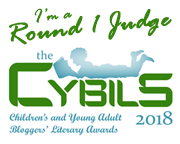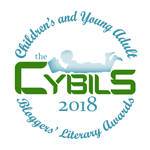
 Nominations are open for the 2018 Cybils Awards!
Nominations are open for the 2018 Cybils Awards!And I'm starting to read books that were actually nominated in my category, Middle Grade Speculative Fiction. So make sure only the best get in there.
This Week I Read:



Toaff's Way, Cynthia Voigt. Eligible. Grey squirrel story -- it's the kind of animal story where the behavior stays close to natural but they have opinions and myths and reasons. There are links with the Young Fredl book. Toaff is different in that he has curiosity and a willingness to go it alone; his big brother is a bit of an oaf and his sister a pleasant memory. He finds other companions for a while but moves on when they don't share his intellectual interests. The book meanders through a year bringing Toaff in contact with several groups of grey squirrels, the strange red squirrels, humans and their enticing but dangerous ways, and a predator I didn't recognize (so that annoyed me because I felt dumb. A weasel?).
The Rose Legacy, Jessica George. Eligible. Super-id-tastic. In a country where horses are feared and thought almost extinct, young Anthea is appalled to find herself exiled to a distant uncle's farm after years of being passed from uncaring relative to unkind relative. And on this farm she discovers that she has a mystical bond with one of the coolest horses, which her family has a tradition of raising. She must learn to ride and save the day. No one understands her and she struggles to figure out the right path, which will resonate with all children around the age of eleven. I was annoyed by the obliviousness of the adults - someone no one expected that the child raised by horse-haters from the age of three would have no idea what is going on at a horse ranch, so they set her up to make a lot of unfortunate errors, but I suspect children reading take that as normal grown-up behavior.
Voyage of the Dogs, Greg Van Eekhout. Eligible. Science fiction about dogs in space. It keeps the doggishness of the characters, but gives humans a translator to understand their meanings, and posits that they can be trained to run and repair space ships. (There are gravity emitters and space singularities -- it's all very modern.)
The personalities of the four dogs are well chosen -- our Hero Lopside is scrappy, small, and energetic; the leader, Champion is bigger but also more cynical underneath. Bugs is an excitable dour engineer, and the puppy Daisy is the biggest and comes up with the innocently genius ideas. As they deal with abandonment and space disaster the pooches also wrestle with the nature of responsibility and their relationship with humanity.






The Book of Boy, Catherine Murdock. Nominated. This book slowly grew on me. For a while I found Boy rather simplistic and passive, but as his body grew so did he. Secundus also seemed more dimensional than I at first expected. The solid integration of the impossible into the reality of the 1350s also worked well for me. And I liked that even when my modern self disagreed with their conclusions or goals their beliefs seemed rooted in their understanding of the world -- its a historical book that really gives a sense of a different time. The tone reminded my of childhood favorite The Door in the Wall, but I haven't read that in forty years so who knows if that memory is accurate.
City of Islands, Kali Wallace. Nominated. I liked the magic system, and the fact that the author doesn't stop to explain it in detail because the protagonist is a beginner and self-taught and just takes it for granted as part of her world. This book doubles down on the orphan motif common to juvenile adventures -- Mara loses two sets of parents before the book even begins, and then misplaces her part-time friend who acts in loco big-sisterus. There is no one to stop her having dangerous adventures, and she has to fight to learn trust people and believe in their permanence even while reshaping the magical understanding of her island-nation. Grit and determination are her trademarks, as well as compassion and loyalty. The actual adventure is fairly straightforward, but the moral implications give it weight.
Snared: Escape to the Above, Adam Epstein. Nominated. A fun concept that should seem even fresher to children -- a view of the adventurers (D&D style) seen from the point of view of the dungeon maintenance crew. The best part is the beginning where the reader is always ahead of Wily in figuring out the truth behind the lies he's been brought up on. And the book goes on to play with many fantasy assumptions while remaining a hero's journey at the core. There's a good blend of easy jokes but also real characterizations -- it's funny that the boy things he's an ugly goblin and his adopted sister reassures him, but they take their chosen family seriously and their loyalty lasts throughout.
The Turning, Emily Whitman. Nominated. A strange book -- the voice didn't quite land for me, but the tone did. Aran's situation came through very powerfully, and his attempts to understand human life worked well, but I never got a good sense of what he looked like or how old he was. But maybe that's because seals mature differently and he thought of himself as a selkie first. Nelly seemed a bit too good to be true, following a bad habit of children's books of having one fully formed character and then accessories. The ending didn't work perfectly for me, but the solo days on the sea were beautiful -- like the ocean in a storm this had a lot of highs and lows. There were parts that felt odd but a lot of times that might have been deliberate, because Aran was odd -- he's not human.
Smoke and Mirrors, K.D. Halbrook. Nominated. Lots of magical realism where the girl lives naturally in a world where reality can echo emotions, which turns grim as she navigates relentless bullies and then a disappearing home life. The secondary characters were barely sketched in and never rose much above good or bad, despite the strong message of the importance of compassion towards everyone. The children's adventures on their voyage to save their parents is imaginative and powerful; I especially liked how hard the older sister tried to trust that her brother could do his part while she did hers, despite her inclination to abandon her task to protect him.
The Royal Rabbits of London, Santa Montifiore. Nominated. A fun romp with an underdog (underbunny?) hero. Little details like the patch for lazy-eye that Shylo wears ground the story for children while letting the rabbit-ness peek through for comedic effect. Shylo is the smallest of his siblings, mocked and scorned but then is the one needed to save the queen of England from evil photographer rats (the bad guys are photo-taking papa-RATzis -- get it!). The heroic rabbit troops share a deep fear of corgis. This looks like a book made for reading aloud, with jokes for adults that might go a bit over the children's heads but never in a mean way.
No comments:
Post a Comment